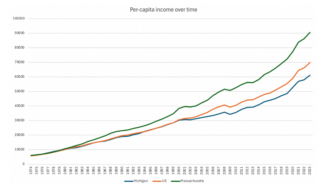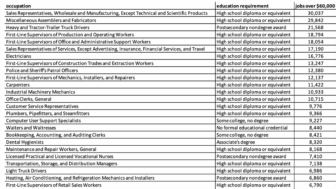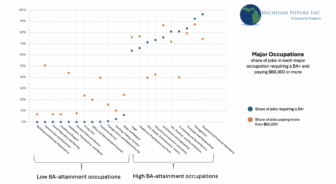At the core of our agenda for ![]() raising Michiganders’ household income is the conviction that human capital is the asset that matters most to individual and state economic well-being. We agree with Governor Snyder when he wrote in his Special Message on Developing and Connecting Michigan Talent:
raising Michiganders’ household income is the conviction that human capital is the asset that matters most to individual and state economic well-being. We agree with Governor Snyder when he wrote in his Special Message on Developing and Connecting Michigan Talent:
In the 20th Century, the most valuable assets to job creators were financial and material capital. In a changing global economy, that is no longer the case. Today, talent has surpassed other resources as the driver of economic growth.
Our research has led us to conclude that the state policy actions that matter most to raising household income for all Michiganders are:
- Increasing education attainment, particularly those with a four-year degree or more, to prepare Michiganders for good-paying 21st century careers. By far the most reliable way to raise Michiganders’ living standards is increased education attainment. The data are clear: the higher one’s education attainment the more one works and earns. The power of education attainment in raising one’s income has been growing for decades. The odds are great that the income gap by education attainment will continue to widen.
- Creating places where mobile talent wants to live and work, particularly vibrant central city neighborhoods, to retain and attract college educated Millennials. Quite simply: Place attracts talent. Talent = economic growth. Our research on the changing American economy has led us to conclude that, quite simply, in a flattening world where work can increasingly be done anyplace by anybody, the places with the greatest concentrations of talent win. The new path to prosperity is concentrated talent.
- Sharing prosperity with those not participating in the high-wage knowledge-based economy by increasing both labor force participation and the returns from working. Most jobs now and in the future will not be high skill. And therefore will not be high paid. This means Michigan cannot reach the goal of rising household incomes for all unless it finds ways to increase the amount of work and the pay and benefits of that work for those with low education attainment.
How do you pay for the above? Many of our recommendations involve increasing public investments. We have long believed, and the data show, that the states and regions with the most prosperous economies––the broadest middle class––will be those who make pubic investments in the assets needed to prepare, retain and attract talent. That ultimately it is talent concentrations, not low taxes, that matter most to economic prosperity. And it is increasingly clear to us that public investments are part of what is needed to broadly share prosperity.
So yes, to implement our recommendations will almost certainly require state taxes/revenue to be higher than it is today. But we think that what that revenue can purchase has the best chance of obtaining a higher standard of living for all Michiganders.
Our research has led us to conclude that by adopting policies that transforms education from birth through retirement and investing in it the state can best help all Michiganders have the skills necessary to have good-paying, forty-year careers. By creating regions across the state with the quality of place where talent from across the planet wants to live and work the state can retain and attract high-wage employers and entrepreneurs that start high-wage businesses. And by establishing and investing in policies that help those not in high-wage work work more and earn more we can share prosperity widely.
This is the recipe for a 21st Century Michigan where each of us can pay the bills, save for our retirement and the kids’ education and pass on a better opportunity to the next generation.
We understand that some will not agree with this recipe. We hope those who don’t agree, propose alternatives on how to increase household incomes of all Michiganders that is aligned with today’s economic realities. That is the debate Michigan needs, rather than pretending that there is some magic elixir that can recreate Michigan’s high-prosperity 20th Century economy.







